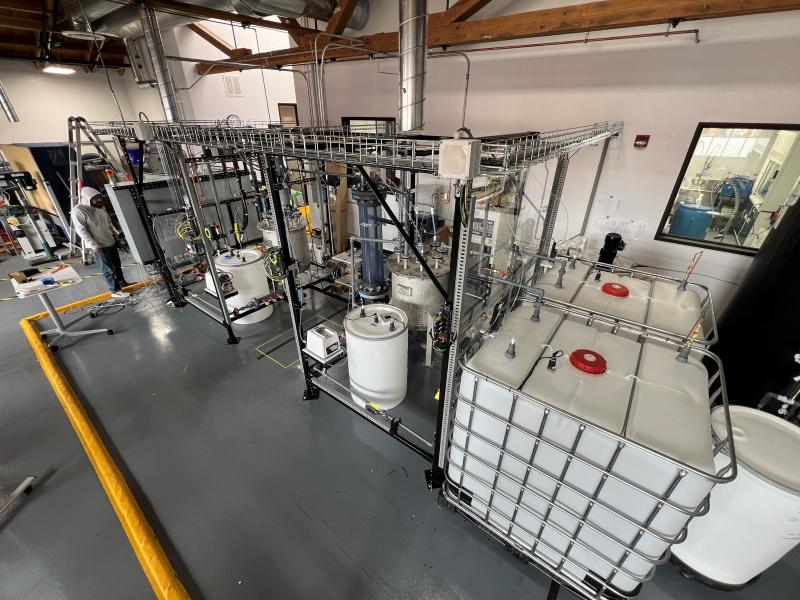
Aepnus Technology Inc. has crossed the 2,000-hour milestone with its waste valorization pilot project in Quebec, setting the company a step closer to commercialization in the province.
Aepnus, an Oakland, Calif.-based company, began operating its test in the community of Becancour in March and plans to wrap up the project in November. Equipment for the pilot system is enclosed in a shipping container,
A team of 12 from the Shawinigan-based National Centre for Environmental Technology and Electrochemistry, trained by Aepnus, has been running the pilot. It turns a byproduct of the battery and mining industries into caustic soda, a prized reagent used in many heavy industries.
Aepnus’ technology avoids toxic chlorine produced in the conventional method of manufacturing caustic soda and neutralizes the environmental and health risks from wastes like sodium sulphate.
“We saw some opportunity to develop some new process technology that would be able to close the loop on taking this waste and basically recycling that chemical back into useful chemicals again for the same industries,” Bilen Akuzum, co-founder and chief technology officer of Aepnus, said in an interview with Sustainable Biz Canada.
Aepnus has made Quebec a critical piece of its business plan. By the end of the decade, Akuzum’s ambition is to see Aepnus operate a commercial-scale facility in Becancour, a city rapidly becoming a battery production hub, producing tens of thousands of tonnes of caustic soda per year.
The two friends behind Aepnus
Aepnus was founded in 2021 by Akuzum and CEO Lukas Hackl, two friends who met as exchange students at the University of California, Berkeley in 2011. Besides sharing a passion for playing musical instruments, the duo also studied for PhDs in the electrochemistry field.
Akuzum and Hackl saw a heavy emphasis on the importance of critical minerals, used to make electronics and clean energy equipment, “but not many people were talking about the amount of reagent chemicals and the wastes that’s coming out of these operations in a linear fashion,” Akuzum said.
Aepnus was created to develop and commercialize the technology they developed to tackle this problem.
Salts are split with electricity to return industrial waste back into its constituent acids and bases. In the case of sodium sulphate, it forms caustic soda. Also known as sodium hydroxide or lye, it is a widely used reagent in battery manufacturing, pulp and paper, textiles and soaps.
“It’s kind of like a win-win situation,” he said about the salt-splitting process. The technology draws from a waste feedstock and reuses chemicals vital for the clean energy economy. It also unlocks domestic manufacturing of caustic soda in Canada.
To start, the company is taking its first step with sodium sulphate. Akuzum said the technology is applicable to other salts, such as phosphates and nitrates.
Aepnus’s Becancour pilot
Aepnus maintains its pilot project in Quebec, a head office in Oakland for research and development, and a subsidiary in Germany, the homeland of Hackl.
Becancour has large-scale battery projects, such as Ultium CAM, which are moving along in development. Some are already producing batteries, Akuzum said. With the demand for reagents and the question of handling the waste from battery production, companies in the city were open to Aepnus’ innovation, he explained.
A pilot system was enclosed in a shipping container and transported to Becancour to prove Aepnus’ technology can operate outside the lab. Partners and investors in the pilot are Ultium CAM, Nemaska Lithium and Vale Base Metals.
To prove its electrochemical technology could function outside the lab for the risk-adverse mining and battery industries, it had to run for at least 1,000 hours, Akuzum said. Aepnus used a sodium sulphate supplied by a nearby supplier for the pilot. The material had significantly more impurities than the limits set by the partners.
Having now operated over double that minimum requirement and produced one tonne of caustic soda, the pilot helped provide the proof its customers would want to see toward commercialization, Akuzum said.
That evidence is needed “so that we can bridge that gap between what the real industry wants to see to adopt this technology, and the capital and work that’s needed to unlock that.”
Plans for a commercial project
The company has received interest in its technology from mining companies, battery manufacturers and recyclers, the paper and pulp industry and textile businesses, Akuzum said.
For its next act, Aepnus is negotiating for a demonstration-scale facility expected to be in Oakland. Then the next box to check is development of a commercial-scale project in Quebec.
To be built in phases, Phase 1 of the commercial facility is planned to have the capacity of processing 15,000 tonnes of sodium sulphate per year. The goal is then to gradually expand to a 60,000-tonne capacity.
Akuzum hopes the Quebec facility will be operational before 2030, but the timeline will hinge on funding.
A Series A funding round will be started “soon” to fund the construction of its demonstration facility in California and break ground for the commercial facility in Quebec, Akuzum said. He did not disclose how much Aepnus expects to raise.










